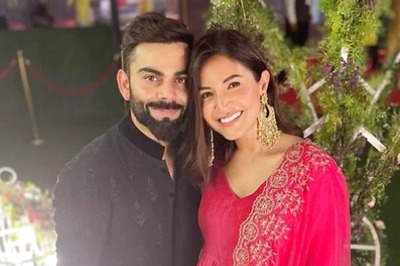
views
Pakistan's powerful Council of Islamic Ideology (CII) has passed a draft proposal for a bill which recommends that “husbands must be allowed to lightly beat their wives” in case the later behaves erratically. This piece of news has obviously raised its own storm across the world.
The country that has given birth and soil to women like Muniba Mazari and Malala, is perhaps still a few light years away from feeling proud about them.
Muniba and Malala have inspired the world, but their own country doesn’t seem to value their battle enough. Regressive laws are not only trying to confine women within the boundaries of patriarchy, but they sound grossly apologetic about whatever women liberation has already taken place.
India has responded to the proposal with its own characteristic social media uprising. But how far are we from them? Let’s face it.
The defence lawyer from a brutal rape case gets along by saying that Indian culture has no space for women and that women should not be allowed to roam around free in the night.
Women are called “whores” as a joke or in response to their disobedience. Or “witch practising black magic” when they are too successful. They are “unlucky” when their partners doesn’t score runs. A female police officer is trolled for doing her duty and disappointing people who were trying to find communal angles in a hopeless murder. Women activists are strewn with acid to tame their “audacity”.
To all of the above cases, that happen way too frequently in India, the country responds with a temporary social media uproar. There is no political or judicial stand against the offenders. No FIRs, no cases, no punishments.
India thankfully and hopefully wouldn’t pull out a proposal to legalise beating women, but are the above practices any less than beating? “Beating”, so as to say, causes physical pain, but here, even the minds of the women aren’t spared.
Drafting the proposal as it happened in Pakistan is a brazen admission of the orthodox lineage that applies there. Sadly, in India, we hide behind our progressive masks and still practise the same regression in a more hypocritical way.
A single woman in this country is considered lonely, vulnerable and available. Parents still advise their girls to get married for security, than for companionship. Recently, Maneka Gandhi, Minister for Women and Child Development had said that “the concept of marital rape, as understood internationally, cannot be suitably applied in the Indian context due to various factors like level of education/illiteracy, poverty!”
In fact, two of our states like UP and Bengal with strong women leaders could do nothing to prevent brutal rapes happening in those states. Probably this cause doesn’t feature anywhere within their agenda either.
At a more domestic level, the television serials that had kept the “saas” and “bahu” together has their own regressive plots. Even the so-called strong women give in to strange demands because that is culturally acceptable and appreciated by the audience.
Even the feisty Ekta Kapoor couldn’t introduce smart, modern women who break prejudices and walk their bold paths unapologetically, instead of a tear-jerker melodrama. The very fact that the later sells shows we are psychologically not in sync with any progression.
The popular Pakistani serials ('Humsafar' and 'Zindagi Gulzar Hai') bringing Fawad Khan to India introduced two ladies – one veiled and introvert and the other westernised and extrovert. We have loved these soaps and celebrated the woman protagonists portrayed with strong poise.
But has anyone thought about the other woman in both these soaps who were forcibly turned into vamps? These women were equally in love with the male protagonist and were not running multiple affairs. Just that they didn’t have a veil on their head, spoke their minds and took their own decisions independently.
The male protagonist could endlessly spend time with them, but when it came to wedding, he was happy with the introvert, home-bound lady. We, the Indians, never noticed this.
But the moment a starlet like Lisa Haydon misplaces the definition of feminism, we are quick to raise alerts.
Do we really believe that we as a country are more progressive with our women? Are we confused or hypocrites?




















Comments
0 comment